- Home
- Linda Newbery
Flightsend
Flightsend Read online
Table of Contents
Title
By the Same Author
Title Page
Copyright Page
Dedication
Part One Flightsend
February
Rose
Part Two Frühlingsmorgen
Runway
Philip Wilson Steer
Sean
Portrait
Saturday Night
Landing
Birthday
Village Fête
Rosie
Misinterpretation
Part Three Scrapbook
Kieran
Flight’s End
FLIGHTSEND
Also by Linda Newbery
The Shell House
Sisterland
Set in Stone
FLIGHTSEND
Linda Newbery
This eBook is copyright material and must not be copied, reproduced, transferred, distributed, leased, licensed or publicly performed or used in any way except as specifically permitted in writing by the publishers, as allowed under the terms and conditions under which it was purchased or as strictly permitted by applicable copyright law. Any unauthorised distribution or use of this text may be a direct infringement of the author’s and publisher’s rights and those responsible may be liable in law accordingly.
ISBN 9781407044156
Version 1.0
www.randomhouse.co.uk
FLIGHTSEND
A DAVID FICKLING BOOK
ISBN: 9781407044156
Version 1.0
>First published in Great Britain by David Fickling Books,
a division of Random House Children’s Books
A Random House Group Company
First published in the UK by Scholastic Ltd. 1999
This edition published 2008
1 3 5 7 9 10 8 6 4 2
Copyright © Linda Newbery 2008
The right of Linda Newbery to be identified as the author of this work has been asserted in
accordance with the Copyright, Designs and Patents Act 1988.
This electronic book is sold subject to the condition that it shall not by way of trade or otherwise, be lent, resold, hired out, or otherwise circulated without the publisher’s prior consent in any form other than that in which it is published and without a similar condition including this condition being imposed on the subsequent purchaser
DAVID FICKLING BOOKS
31 Beaumont Street, Oxford, OX1 2NP
www.kidsatrandomhouse.co.uk
www.rbooks.co.uk
Addresses for companies within The Random House Group Limited can be found at:
www.randomhouse.co.uk/offices.htm
THE RANDOM HOUSE GROUP Limited Reg. No. 954009
A CIP catalogue record for this book is available from the British Library.
For Liz, again
Part One
Flightsend
Flightsend arrived on their doormat, in an envelope from the estate agent.
‘This looks interesting,’ said Kathy, opening her letters by the toaster. ‘Here, see what you think.’
She passed one of the printed sheets to Charlie. These arrived so often now that Charlie had stopped taking much notice. At first, she and her mother had read them all carefully, making comparisons, highlighting important points; they’d visited countless unsuitable houses and had learned to read through estate-agent jargon. Even now, with the Sold notice in their front garden and the buyers waiting to move in, most of the printed sheets went straight into the recycling bin: too expensive, not enough garden, too big, too small. If a house looked promising enough for a visit, Kathy went on her own, always – so far – returning disappointed.
With each reject, each sheaf of papers to hit the bin, Charlie’s hopes rose. Perhaps Mum would give up the idea of moving. They’d take down the Sold board and stay here, close to the town centre, close to her friends. Close to the life she knew. But the life they knew was the one Kathy wanted to get away from.
On Thursday, while Charlie was at school, Kathy went to see Flightsend.
‘It’s perfect!’ she reported. ‘There’ll be a lot of work, but it’s just what I’ve been waiting for. You’ll love it, Charlie. Just wait till you see.’
They went together on Saturday, a raw autumn day that was more like winter, stirring memories of foggy mornings and afternoons dark by four-thirty.
‘You’ll have to navigate. These country lanes are a maze.’ Kathy put the road atlas on Charlie’s lap. ‘Here.’ She pointed at a tiny black cluster around a road junction. Lower Radbourne.
‘It’s a long way from town,’ Charlie said doubtfully. ‘A long way from anywhere.’
Kathy craned her neck to reverse out of the driveway. ‘Yes! A real village. Pub, village shop, church.’
And what am I supposed to do for a social life? Charlie wondered.
She didn’t ask. Mum would only remind her – as if she needed reminding – that GCSEs were looming, mocks and then the real thing. As they left the town and took a country lane between hedges, Kathy sat forward, her eyes scanning the road as if her perfect house, her dream cottage, might have moved itself closer to surprise her. Dried leaves clung to the beech hedges on either side; an open gate showed a muddy field entrance, rutted and puddled. Charlie saw horses sheltering in an open-sided barn and sheep huddled against a hedge. Ahead, a ploughed field rose to a line of tousled trees and an unpromising grey sky. Nothing looked very cheerful today, but Kathy was humming to herself as she slowed down and pulled over to the verge for a Land Rover coming the other way. The driver raised a hand in acknowledgement; Charlie glimpsed a peaked tweed cap.
‘These roads are so narrow,’ Kathy said. ‘It must be difficult getting a coach round the bends.’
‘Coach?’
‘Coach. Bus. School transport,’ Kathy said.
She’s made up her mind, Charlie thought, before I’ve even seen the place. Well, I’d better decide to like it, then.
There was no one about in the village. The main street kinked at odd, awkward angles: a dog-leg by the pub, two sides of a triangle round a village green. Lower Radbourne consisted of one substantial Georgian house behind a gated wall; a pub, The Bull and Horseshoes; a tiny shop and Post Office with an OPEN sign on the door, and a scattering of cottages and small houses.
‘Here’s the church,’ Kathy said. ‘Norman, I should think.’
Charlie saw a lych-gate set in a hedge; farther back, gravestones and a sturdy building with a tower and an arched porch. Kathy turned sharp right down a track beside the churchyard wall, then pulled up.
‘This is it!’
They got out of the car. Charlie turned up her coat collar against the wind. The cottage, uninhabited for six months and wearing an air of abandonment, stood alone, sheltered by the churchyard yews. There was a tangled front garden, with a gate that hung lopsidedly from one hinge. Flightsend had blank, staring windows, and a porch that would probably collapse if no one did anything about it. In need of renovation, Charlie thought. And soon.
‘What does it mean, Flightsend?’ she asked.
‘I don’t know. Flightsend. Flight’s End. Well, that’s what it is, isn’t it? An end to – well, to everything that’s gone wrong.’
Charlie thought: I don’t want ends. I want beginnings. The gloom of the place settled round her like fog. She thought of long winter evenings marooned here, miles from her friends. We’ll be castaways, she thought, me and Mum. Flight’s End was making her think not of settled contentment but of clipped wings, of pinioned birds.
‘Perhaps it’s to do with the old airfield,’ Kathy said, shoving the wonky gate aside.
‘But the house is much older than the airfield,’ Charlie pointed out. ‘A hundred a
nd fifty years old, the blurb says. Aeroplanes hadn’t been invented then, had they? Not even those ancient ones with wings that people flapped with their arms. How old’s the airfield?’
‘Wartime, I should think. Someone renamed the house later, perhaps. It’s a nice name, anyway. I like it.’
But as for the cottage itself – Charlie couldn’t imagine it as anyone’s home, let alone her home. She saw only dilapidation and neglect. The house was perfectly symmetrical, like a child’s drawing: the front door and porch, windows either side, two bedroom windows above; chimney-stacks each side of a tiled roof crusted with lichens. A weedy gravelled path led to the open-fronted porch and a door that had curls of paint peeling off; the nearest window showed a bare, gloomy main room that was probably full of cobwebs. Kathy stood smiling in the rain, not bothered about her wet hair. Her love-at-first-sight optimism was undiminished by cold wind and spattering rain. Charlie guessed that she saw climbing roses and honeysuckle, not dereliction and decay.
‘It’s perfect, isn’t it?’ Kathy said, turning to Charlie for agreement. ‘I just knew! As soon as I saw it. And the name. It’s just right.’
‘But what about the inside? It looks like a ruin.’
‘Of course it isn’t. People were living here till six months ago.’ Kathy led the way past the frontage to a yard at the side. ‘Plenty of space, that’s the really good thing. Just imagine, Charlie, when I’ve got it organized, with a little sales office, and signs up in the village and at all the road junctions. I can even do mail-order plants once I’m fully-stocked. Exhibit at shows, build up a reputation …’
Charlie saw ramshackle outbuildings that looked as if they’d better be pulled down before they collapsed. An open-sided barn was full of junk – plastic sacks and what looked like rusty, outdated farm equipment.
‘It’ll cost a lot, won’t it?’ she said cautiously. ‘Doing this place up.’
‘Oh, well.’ Kathy shrugged off the question as if money were totally irrelevant. She pushed through shrubs and wet leaves to the front door and opened it with the estate agent’s key.
Inside wasn’t much more inspiring. Dust, bare floors, an ancient strip of carpet that ran up the stairs.
‘But look at the thickness of these walls,’ Kathy said undaunted, slapping one. ‘And there’s nothing wrong with the plastering. Which bedroom would you like?’
The two upstairs rooms were almost identical, one each side of the central staircase, with a bathroom between – ‘Look at the bath! Real claw feet. You’d pay a fortune to buy one like that’ – and windows front and back. Each room had a fireplace with a mantelpiece, and the back windows, though small, looked over the garden, with meadows, beyond, sloping down to a tree-flanked stream.
‘Oh, this is nice!’ Charlie said, in the left-hand room that had an extra window at the side, imagining it curtained and carpeted, with her own things installed. The three windows gave the room an airy lightness, even on this dismal day. Bookshelves stretched each side of the fireplace.
‘Good! You have this one, then,’ Kathy said. ‘It’s the first time you’ve sounded at all keen. I do want you to like it! It’s just what I want, Charlie. More than that. It’s what I need.’
Charlie hesitated. Would it be best to go along with Mum’s new mood of sparky optimism? Or to deflate her by asking all the questions that came to mind? (Like: How are you going to make any money, out here in the sticks? What will we live on?) It was the first time in months – no, almost a year – that Charlie had seen her mother so positive, even excited; it would be mean to turn cynical. She tried not to think that this cheerfulness might be temporary, brought on by the new anti-depressant pills her mother was taking. They couldn’t rebuild their lives on pills.
All the same, there were practical considerations that needed mentioning. She waited until they were in the car, heading back along the lanes, before saying, ‘Mum, aren’t we going to be a bit stranded, out there? I mean, you’ve got the car, but how am I going to get about?’
‘There’s the school bus. It stops at the village hall. I checked.’
‘I don’t mean just for school,’ Charlie said. ‘I mean – what about my social life? Unless you want me to join the Young Farmers, or learn maypole dancing?’
Kathy slowed to pass a horse-rider, who raised a hand in thanks. ‘It’s not that much of a problem, is it? You’ve got your bike, and I can always give you lifts to parties or whatever. Anyway, it’s only another year before you’ll be seventeen, and then you’re bound to want driving lessons. Your own car, eventually.’
‘Yes, but how can we pay for all that? Driving lessons aren’t cheap.’
‘Oh, I don’t know. We’ll wait and see. Things will sort themselves out,’ Kathy said.
Charlie gave up. It was no good trying to reason with Mum, in this new mood of optimistic vagueness. She thought: this means so much to her. Too much. If it fails …
If this fails, too – then what?
She didn’t want to know the answer.
February
Charlie walked down the stony track from the village hall where the bus had dropped her. A half-hearted fog had lingered all day; the school bus had its headlights on, even though it was only four o’clock, and mid-February, when the days could be expected to lengthen. Her bag, weighted with three lots of homework, pulled at her shoulder. Behind the yew trees at the end of the churchyard, Flightsend looked almost as unwelcoming as when she’d first seen it; there were no lights in the front windows, and the face it presented to approachers said Here I am – like it or not, I’m not trying to impress. And then, as she opened the front gate, Charlie’s eye caught a splash of golden-yellow in the border by the hedge. Winter aconites, a drift of them. The first flowers must have opened today, above the frilled green rosettes of their leaves. Her mother, busy with cleaning and restoring the house and outbuildings, had found time to clear the overgrown garden, and now here were the aconites, floating like golden lilies on the dark soil. They had waited underground all through the winter frosts, and now they were opening their petals at the first hint of winter yielding to spring.
Charlie wondered whether her mother had come out this way and seen them. They never used the front door. The kitchen was where they mainly lived, at first because it had been the warmest room in the house, and now because they were used to it. Charlie walked round the side path. Something else was piercing the soil in the dug border under the front window: something green and speary. Mum would know what it was.
Flightsend had been home for nearly two months now. To Charlie, it still didn’t feel like a proper home. Home was their old house in town; home was family. And Sean. Now, it was just Charlie and Mum, and Charlie was finding it hard to adapt. This was how it had been before Sean came, and she’d liked it then. But now was different.
They’d moved in just after Christmas, in the coldest months of the year, shivering in the draughty rooms, and coaxing the Calor gas boiler into life. They got used to wearing bulky layers of clothing and two pairs of socks, and to using what Kathy called a sausage – a tube of fabric stuffed with old tights – to block the cold air that whistled under the doors. In January, while Charlie sat her mock exams, Kathy scrubbed and cleaned and painted, and got a builder in to repair the porch and the window frames. She got the ancient central heating system serviced, bought furniture cheaply at auctions, threw an Indian bedspread over the faded sofa and hung pictures. She worked outside, clearing the sheds, making space for her plants. She was tireless, always talking of her plans, looking forward to the day when she would open Flightsend Hardy Plants.
Charlie kept most of her doubts to herself. Flightsend was miles from anywhere and even visitors to the village could easily overlook it. There would be fierce competition from the big garden centres on every main road, with cafés and children’s playgrounds and multicoloured displays of bedding plants; how could a small, specialist nursery, tucked out of sight in a remote village, hope to make any sort of income? At
first Charlie and Sean, joining forces, had tried to talk Kathy out of what seemed a mad, impulsive scheme, trying to persuade her to keep her teaching job; but Kathy refused to listen to Sean. She pushed him away, out of her life.
Out of her life; but as Sean was a PE teacher at school, Charlie still saw him most days. She’d seen him today, in the canteen at lunchtime. At a time of year when everyone else was bundled up in sweaters and scarves, Sean was a conspicuous, athletic figure in a short-sleeved polo shirt and tracksuit bottoms. Even in winter his skin was tanned from the hours he spent outside on the sports fields. Catching sight of Charlie as she left the servery with her sandwiches, he came over to ask, as he often did, how Kathy was. Charlie always wanted to ask him, though she hadn’t, so far: ‘And how are you? Are you managing on your own? You haven’t met anyone else yet, have you?’
And beneath the casualness of his question was a sort of pleading that made Charlie want to tell him lies, give him the answer he wanted. ‘She’s falling apart. Come back. She wants you. We both want you.’
But all she said was, ‘She’s OK, thanks. Getting organized,’ and Sean nodded and went back to the other teachers at his table. Charlie still didn’t understand why Mum had rejected him, stubbornly choosing isolation and uncertainty. Sean was, in Charlie’s view, the best thing to have happened to both of them since her own father had left, longer ago than she could remember. It would have seemed odd to call someone as young as Sean her step-dad, and in any case he and her mother weren’t married; but nevertheless he’d been family for five years of her life, and now he wasn’t. No one had asked Charlie how she felt about that.
She lugged her school bag into the warmth of the kitchen and found a gangling, skinny dog gazing devotedly at Mum, who was chopping vegetables by the sink.
‘Whose is that?’ asked Charlie, bending to stroke it.
‘I don’t know,’ Kathy said. ‘He just turned up, hanging round outside. Poor thing looks half-starved. I’ve given him some cereal and a bowl of milk, and I’ve phoned the police.’
The dog wriggled and tried to lick Charlie’s face. He was rough-coated, gingerish in colour and still half a puppy, with limbs not quite under control and an anxious, pleading face. He wore a collar, but no name tag.

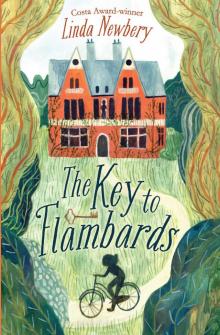 The Key to Flambards
The Key to Flambards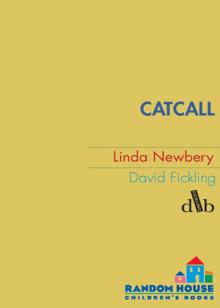 Catcall
Catcall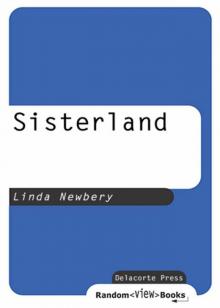 Sisterland
Sisterland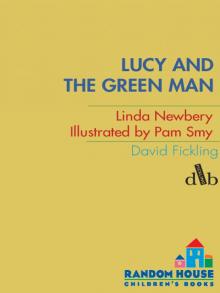 Lucy and the Green Man
Lucy and the Green Man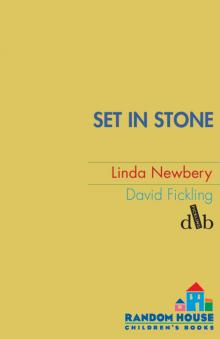 Set In Stone
Set In Stone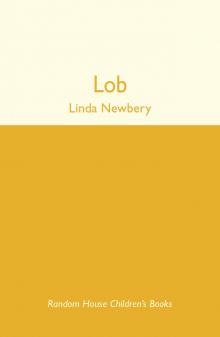 Lob
Lob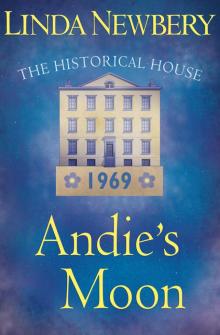 Andie's Moon
Andie's Moon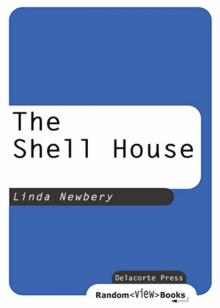 The Shell House
The Shell House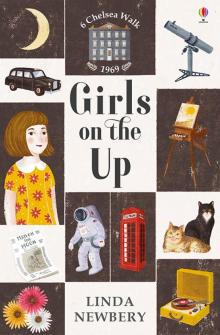 Girls on the Up
Girls on the Up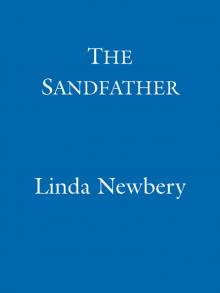 The Sandfather
The Sandfather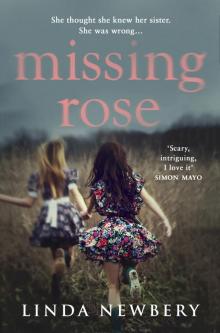 Missing Rose
Missing Rose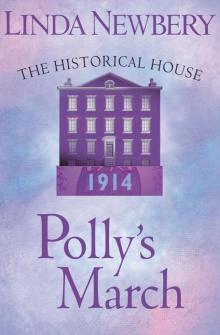 Polly's March
Polly's March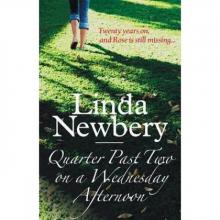 Quarter Past Two on a Wednesday Afternoon
Quarter Past Two on a Wednesday Afternoon Flightsend
Flightsend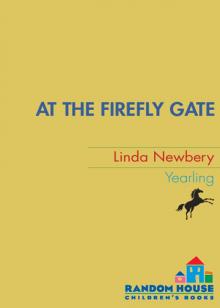 At the Firefly Gate
At the Firefly Gate